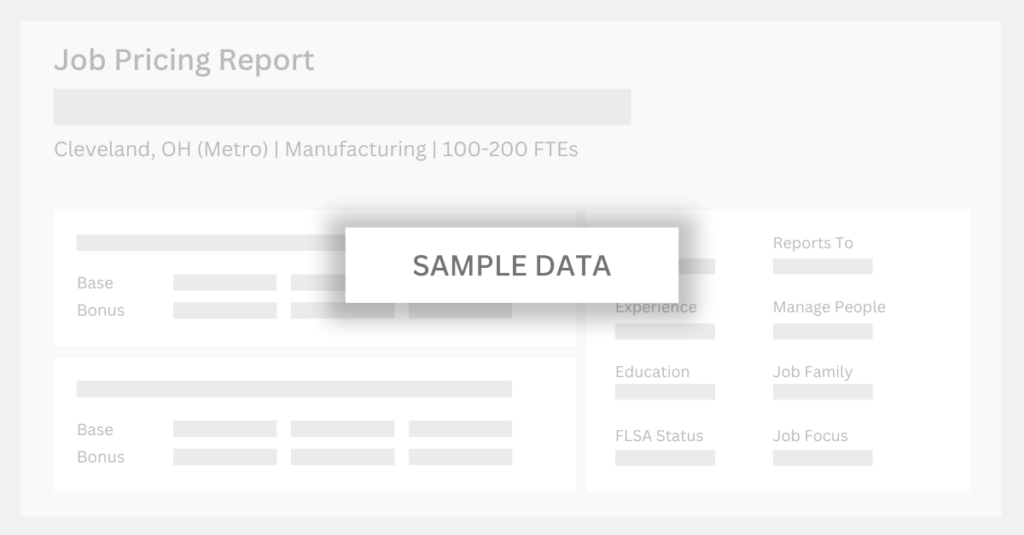Compensation Data for a Staff Accountant in Ohio

Compensation data breakouts:
- Location (example: Cleveland, Akron, Ohio, National)
- Company Size (number of full-time employees)
- Industry (industry-specific or all industries)
- Years of Experience
- Education
Data included in each report:
- Base Compensation (Salary or Wage)
- Total Compensation
- Bonus
- Long-term Incentives
- Job Description
- Competencies/Skills
Get a Free Sample Report
Submit the form below to receive a sample job pricing report or to access ERC’s compensation data.

ERC is a leading provider of compensation data
Whether you’re actively recruiting and hiring or trying to stay competitive, having local salary and wage data is critical. ERC members gain access to compensation reports, job description research, and an HR Help Desk for compensation and workplace practices data.
Job Description
Overview
- Maintains the general ledger, reviews financial statements, researches accounts, and analyzes financial records.
- Develops spreadsheet reports, verifies information, prepares journal entries, and reconciles accounts and balance sheets.
- Prepares financial statements and reports, and assists with monthly closing processes.
Typical Functions
- Contributes to the development, review, and implementation of the operating budget and performance projections.
- May conduct financial audits.
- Analyzes current accounting policies and procedures, and recommends changes for improvement.
- Responds to information requests, researches and interprets data, and answers accounting and financial questions.
- Meets processing and reporting deadlines.
Similar Positions
There are several positions that share similar responsibilities to a Staff Accountant, including:
- Accountant
- Junior Accountant
- Financial Accountant
- Accounts Payable Accountant
- Tax Accountant
- Payroll Accountant
- Financial Analyst
Experience and Education
A Staff Accountant typically requires a combination of education and practical experience in the field of accounting. Most employers prefer candidates with a bachelor’s degree in accounting, finance, or a related field. Some positions may require additional certifications, such as Certified Public Accountant (CPA) or Certified Management Accountant (CMA).
Practical experience is crucial, and entry-level staff accountants often gain relevant experience through internships or entry-level accounting positions. They should have a solid understanding of accounting principles, financial reporting standards, and proficiency in using accounting software and tools. Attention to detail, strong analytical skills, and the ability to work with numbers accurately are important for preparing financial statements, reconciling accounts, and analyzing financial data. Effective communication and collaboration skills are also valuable for interacting with colleagues, clients, and external stakeholders.
Continuous learning and staying updated with changes in accounting regulations and best practices are essential in this field.
Competencies and Skills
- Accounting knowledge
- Attention to detail
- Financial analysis
- Organization and time management
- Audit and compliance
- Mathematical and analytical skills
FAQ
The classification of staff accountants as exempt or non-exempt from overtime pay depends on various factors, including the job duties, salary level, and applicable labor laws in the specific jurisdiction. In the United States, for instance, the Fair Labor Standards Act (FLSA) governs the classification of employees as exempt or non-exempt.
Generally, staff accountants who primarily perform routine accounting tasks and do not exercise significant independent judgment or decision-making may be classified as non-exempt and eligible for overtime pay. However, staff accountants with more advanced responsibilities, such as financial analysis, budgeting, or managerial tasks, may meet the criteria for exempt status if they satisfy the FLSA’s requirements for the executive, administrative, or professional exemptions. It is important for employers to consult relevant labor laws and seek legal guidance to ensure proper classification and compliance with applicable regulations in their jurisdiction.
Through frequent polls and surveys, ERC offers a comprehensive collection of recent, reliable data covering workplace practices, employee compensation, benefits, wages, and salaries from local, regional, and national samples.
While “free” compensation data can be found on the web, here’s why you should be cautious:
- Validity — Often “free” salary data is collected from anyone willing to participate or share information. This means you don’t have a good sense of how big the sample size is, the geography of the data, or the type or size of organizations from which the data is being collected.
- Recency — ERC’s survey data relies on regular and consistent participation to ensure that the data is recent, while “free” pay data sources may provide data that is many years old.

